REK Equipment
Founded: 2004
Location: Uniondale, Ontario
Employees: 5
Lines: Dixie Chopper, Bob-Cat, Lastec, Ventrac, Scag, White, EZ-GO, Club Car, Yamaha, Shindaiwa and Vortex
Bob Kittmer, owner and general manager of REK Equipment in Uniondale, Ontario, has found unique ways to satisfy the needs of the large property owners and poultry farmers in his area. The customers speak, and Kittmer listens, earning him enough success to begin building a new, larger facility.
Kittmer hasn’t always been on the dealership side of the industry. He began his career as a service technician in the heavy equipment industry with farm equipment and trucks before transitioning into selling farm and grounds care equipment for John Deere. After 15 years with Deere, Kittmer saw the industry changing and decided to change, too. A shrinking farm customer base was making it tougher to sell large ag equipment. After leaving Deere, he began doing insurance appraisals. That business quickly dried up as insurance costs rose and so he moved on to begin his own business.
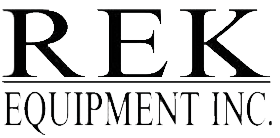 He launched REK Equipment in 2004 as a used grounds care equipment dealership, running the operation out of his garage. “I guess I got to the point, even when I was in ag sales, of putting in a ton of hours, where I thought, ‘If I have to work those long hours, I’m going to do it for me,’ ” Kittmer says.
He launched REK Equipment in 2004 as a used grounds care equipment dealership, running the operation out of his garage. “I guess I got to the point, even when I was in ag sales, of putting in a ton of hours, where I thought, ‘If I have to work those long hours, I’m going to do it for me,’ ” Kittmer says.
Motivating Factors
Kittmer began his own business because he noticed a demand for better customer service that wasn’t being met, as well as hearing from disgruntled large property owners and hobby farmers. The grounds care equipment needs of the area were being handled by large ag equipment dealers, who, Kittmer says, were more focused on selling large ag equipment than on selling and servicing grounds care equipment.
Opening his own dealership brought along its own challenges for Kittmer in those first few years of business. He says his biggest challenge was meeting the large demand and securing enough used equipment. He had no trouble building a customer base, but it was always a struggle trying to decide how much inventory to stock. He says, ‘There’s no ‘magic 8 ball’ for knowing how much used to buy.”
“There’s no ‘magic 8 ball’ for knowing how much used to buy...”
In 2005, Kittmer made the decision to add new equipment to the dealership. His first new equipment line was Dixie Chopper because of the increasing interest and demand for zero-turn mowers. He says, “We were getting more and more calls for zero-turn mowers and other grounds care equipment, so we took on Dixie Chopper as our main line. Dixie Chopper is kind of a niche machine for boys who like their toys.”
With the addition of the Dixie Chopper line, his store now had more selection to offer large property owners and that portion of the business increased from about 25% to 50% of his annual revenue. Soon after, he added Ventrac commercial mowers and EZ-GO, Club-Car and Yamaha golf carts. In addition to these lines, REK now carries Bob-Cat, Lastec, Scag and White lawnmowers, Shindaiwa power tools and Vortexx power washers. The combination of these lines gives Kittmer a complete mower and outdoor power equipment offering for his rural lifestyle customers.
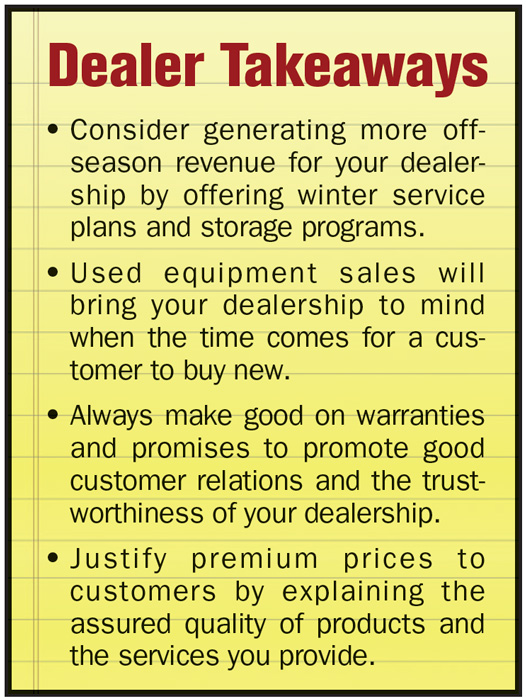
Dealing with manufacturers when acquiring new lines was a challenge, Kittmer says. “It was like they wanted us to sell off our first born just to get in the door. They all push. They want you to buy a whole lot of stuff. I sat down with them and said, ‘Here’s what I’m going to do and here’s what I’m going to buy.’ ”
To decide what lines to carry, Kittmer says, “We did a lot of research and read reviews from commercial cutters and large property owners. With Ventrac, we were targeting the poultry industry in Ontario as well as commercial contractors.
“We have a fair number of campgrounds in the area as well and golf carts are becoming more and more popular with the campers. The rest of our golf cart market is farms and large property owners who don’t want to spend tens of thousands of dollars on a side-by-side or a four wheeler. Golf carts aren’t a huge part of our revenue, but it draws people in the door. We get a lot of customers who come and say, ‘My neighbor has one and now I want one.’ A lot of times we’ll have someone stop to look at a golf cart and a year later come back for their other equipment needs. It exposes them to everything we’re selling.
“When looking for lines, we always try to feel out the market and see where it’s at before we jump into it. You certainly don’t want to jump in and be out of it in 2 years. Our plan is that if we take something on, it’s for the long term,” he says.
Kittmer is currently investigating the possibility of adding a compact tractor line in the near future to continue growing his large property owner and hobby farmer customer base.
Studying Trends
The transition from solely dealing in used equipment to selling both used and new equipment was a smooth one for REK, driven by Kittmer’s attentiveness to his customers’ needs. Making the transition has also helped his used business. “Selling new equipment creates trades and that give us more access to used equipment. We also buy from ag dealers or even from competing dealers,” he says. “Transitioning from strictly used to carrying new and used has given us the opportunity to make trades and lets us buy used when the time and piece is right.”
However, Kittmer admits that the used equipment market can be fickle. “Every year is a little different. A year and a half ago, we could hardly give a used piece of equipment away. The used market was tough. This past year, for some reason, at the end of the season, we had 40-50 used pieces, and then in late spring, within 3 weeks we were out of used equipment, which allowed us to buy again.”
He says that having the right amount of product when customers want or need it is one of the biggest challenges he faces. “I think that’s improved in the last couple of years, but in the past, it’s been an issue.”
The dealer pays close attention to trends now and is always looking where the market is going. “Forward thinking is very important,” Kittmer says. “It’s important to look at the past, too, but you can’t put as much emphasis on the past as you do on what’s coming.”
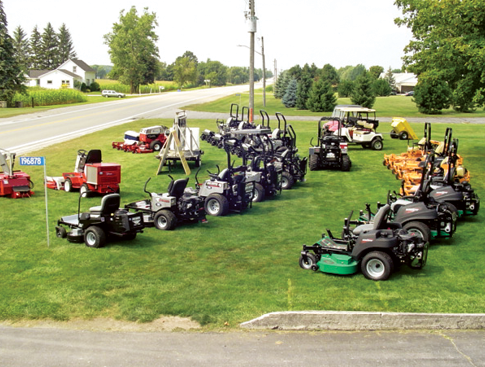
REK offers a diverse selection of lines, from zero-turn mowers to golf carts, to meet the demand of the dealership’s large property owner and hobby farmer customer base.
More experience is also a factor. He says, “You’re never going to please everyone. You have to focus on what your best idea for what’s coming is. You also have to try to create trends in your local area.”
Kittmer says it’s important to know the buying patterns in your area, as well. For instance, lots of rain in late summer helps extend the season and pushes customers to make more end-of-season purchases. “Usually by early fall, it’s very dry and the grass is burnt up. But this past year, we’ve had lots of rain and cool days, so the grass was still as lush as it was in May,” he says. “That always helps because you get people who think, ‘Well, my old machine will make it through,’ but then you get a long summer like last year and they find they can’t make it through because they’re still cutting grass at least once a week.”
Offering Warranties on ‘Used’
REK’s approach to used equipment is based on offering quality machines. “Selling used equipment can be very lucrative at times, but if you’re not buying right, it can be not so lucrative. We don’t sell junk. If it’s junk, it goes to scrap or we wholesale it out to one of several wholesalers. If we have a good quality trade, it’s reconditioned and sold with a warranty. That’s not very common here in Ontario. Warranties for used grounds care equipment are almost non-existent here. That being said, we also ask a premium price for our products.”
This isn’t always easy. “We struggle with the people who don’t know the difference between the big box store stuff and our products. They look at our prices and say, ‘You’re crazy!’ But 9 times out of 10, within 3 years, they’re back standing in our yard,” Kittmer says. “It’s taken time to educate people that you get what you pay for. People come to realize that the lowest price is never the best value.”
He says the warranty also shows his customers that he only sells quality machines, regardless of whether they are new or used. “The way I put it to our customers is that we’ve reconditioned and gone over the machine and we have enough confidence in it that we’ll give the customer a full season’s warranty,” Kittmer says. “If we didn’t have confidence in ourselves, we wouldn’t do it.”
And he’s ready to back up the warranty if something does go wrong. “We’ve had two failures in the last 5 years where we had to dig into our pockets. But we did the job and when we did, word spread like wildfire and the customer was thrilled to death.
“We showed that it wasn’t just a line. We made it right so now the customer tells everyone he talks to about it and that’s a dividend. At the time, I thought, ‘Why did I do this?’ But at the end of the day, if you look at the big picture, it was worth it,” he says.
Promoting Service
Successfully selling used equipment leads to new equipment sales for Kittmer. “A lot of times, people we’ve sold used equipment to are happy with our service and when it comes time to buy a new piece of equipment, they tend to lean toward us. The fact that we’ve serviced them properly in the past means a lot,” he says. “The key to this industry is service. Do that properly and the rest will come.”
REK sells a lot of service contracts with new equipment. “The large property owners are mostly baby boomers with cottages. They don’t want to spend time fixing things. With our service contracts, customers just call us in the fall when they’re done for the season, we pick up their equipment and service it at some point in the winter and return it to them in the spring so they’re ready to go. It takes the heat off us in the spring and keeps us busy through the slower winter months.
“We ran into the whole service and cold winter storage thing accidentally. We had a customer who requested that we service and hold their equipment over the winter and when we did, the program spread by word of mouth. We were quite surprised by the demand for it and it seems to keep growing. The more service contracts we sell, the more people come in and ask about it. It started out as a handful of customers and has grown to the point where the new facility is really quite necessary to keep up with the winter storage.”
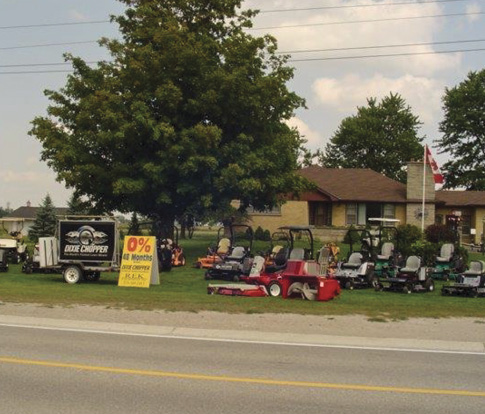
Adding a New Facility
Now, 10 years after opening, REK Equipment is expanding and building a new facility. REK’s new 80 x 120-foot facility will include a showroom, parts and service and cold storage.
To design the new facility, Kittmer looked at other dealerships. His first priority was a showroom with a reception and parts area, as all of REK’s equipment is currently shown on the lawn outside the dealership. He also wanted the facility to be welcoming and bright. Kittmer says the building is designed so they can easily expand when the time is right, by opening up one wall.
As the service contract and cold storage program expands, he anticipates the need for more cold storage, as well. He plans to design the space so mowers can easily be stored in crates to maximize the facility, while still giving the staff access to the machines.
“If you have machines that you’re storing that you don’t get to until January, that’s fine,” he says. “You just pull them out, service them, put them back in their crates and come spring, you can easily deliver them.”
The new facility will have roughly 6 acres of land to allow customers to try machines on site. Kittmer says, “There will still be situations where we have to demonstrate on their property because they have unique situations. But if a customer has a normal lawn and just wants to see the machine run, we can eliminate the expense of sending a truck, trailer and personnel with them to their house. It will really help reduce the cost.”
Location was another important factor for the new facility. Kittmer says, “We found the right location and the right property. We’re on a highway and it’s very good as far as traffic and visibility go. We knew we didn’t want to move too far away, because then it’s just like starting up all over again. So the new facility will be a quarter mile down the road from where we are currently and where we’ve been since we started. It’s a nice rural community and that’s worked well for us.”

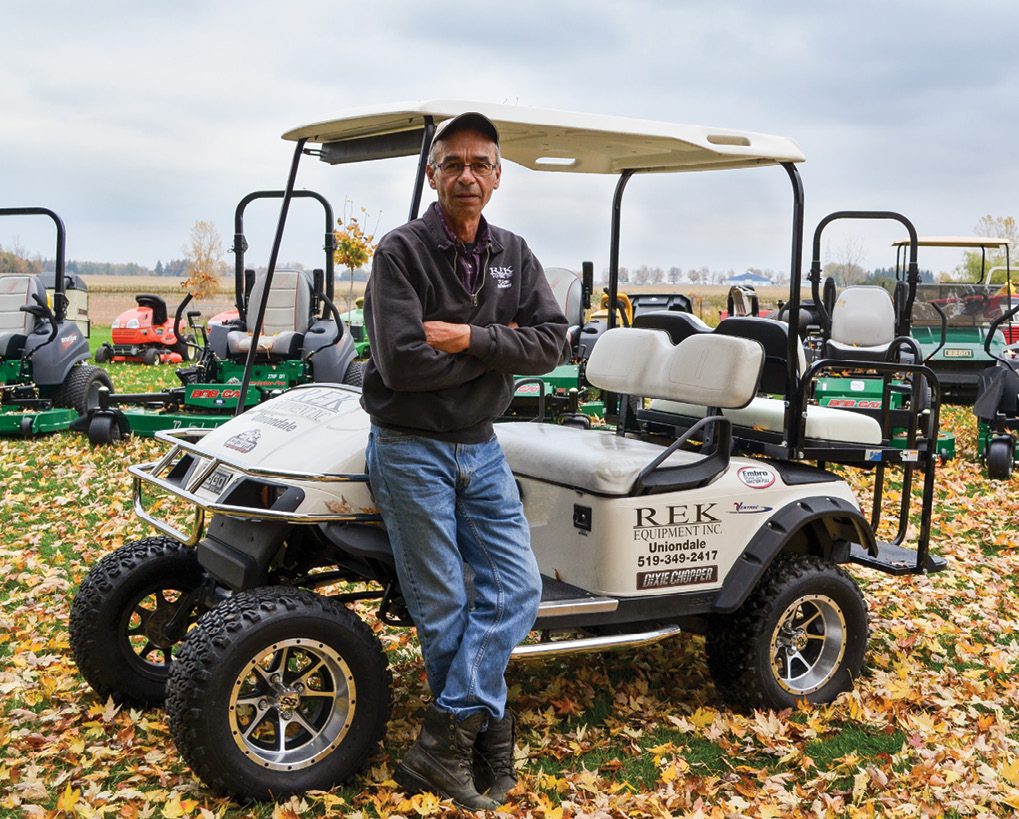
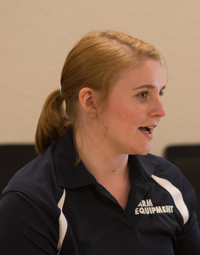



Post a comment
Report Abusive Comment